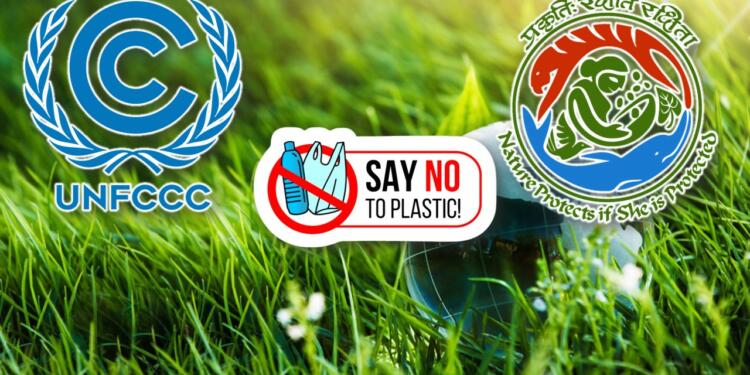Plastic is one of the biggest revolutionary inventions of humankind. The affordability, durability, weightlessness, and hygiene are what make single-use plastics used widely. But the challenge in recycling them is now forcing governments around the world to ban single-use plastic. Single-use plastics take thousands of years to decompose posing hazards to land, water, and wildlife. Its non-biodegradable characteristics and gradual disintegration into minute bits endanger living lives on earth. Considering all these drawbacks, India has now decided to ban Single-Use Plastic (SUP).
Single-Use Plastic Banned
Working on its pledge to ban single-use plastic, the Ministry of Environment, Forest and Climate Change (MoEF&CC) has issued an order to “ban manufacturer, import, stocking, distribution, sale, and use of identified single-use plastic items, which have low utility and high littering potential, all across the country from July 1, 2022”.
1 जुलाई 2022 से सिंगल यूज़ प्लास्टिक की कई वस्तुएं प्रतिबंधित हैं…
आइए हम सभी एक सतत भविष्य के लिए दें अपना योगदान!@byadavbjp @AshwiniKChoubey @PIB_India @mygovindia pic.twitter.com/ycH41UsJuj— MoEF&CC (@moefcc) June 28, 2022
The list of banned items includes – earbuds with plastic sticks, plastic sticks for balloons, plastic flags, candy sticks, ice-cream sticks, polystyrene (Thermocol) for decoration, plastic plates, cups, glasses, cutlery such as forks, spoons, knives, straw, trays, wrapping or packing films around sweet boxes, invitation cards, cigarette packets, plastic or PVC banners less than 100 micron and stirrers.
To make the policy successful, MoEF&CC has set up National and State level control rooms for checking illegal manufacture, import, stocking, distribution, sale, and use of banned single-use plastic items. Recognizing the public participation critical in banning the SUPs, the awareness campaign has been launched to coordinate with entrepreneurs, startups, industry, Central, State, and Local Governments, regulatory bodies, experts, citizens, organizations, and R&D and academic institutions.
Read More: Say No to Plastic Bags: No to plastic equals Yes to a healthy life
India forerunner in environmental protection
India is one of the top-performing countries in terms of achieving the UNFCCC’s (United Nations Framework Convention on Climate Change) climate change targets. India has been ranked high in the Climate Change Performance Index (CCPI) released by Germanwatch. With the ambitious Nationally Determined Contribution (NDCs) and climate policy aligned with it, India now leads the world in environmental protection measures. The government’s order to ban SUPs is in the same direction to control the plastic pollution in the environment.
According to the Central Pollution Control Board (CPCB), India generated 4226997 tonnes of plastic waste in 2020-21, which effectively means a single person is generating 3kg plastic waste per annum. Reports suggest around 683 units are manufacturing 2.44 lakh of SUP per year and recently CPCB has revoked or modified the consent of 433 such units.
Read More: No Plastic Day: 10 things to know about this day
Further, to ensure the cyclical economic model of plastic use, the government has amended the Plastic Waste Management Rules in 2022. The Plastic Waste Management (Amendment) Rules 2022 provides for: –
- Classification of Plastics:
- Category 1: Rigid plastic packaging will be included under this category.
- Category 2: Flexible plastic packaging of a single layer or multilayer (more than one layer with different types of plastic), plastic sheets and covers made of plastic sheets, carry bags, plastic sachets or pouches will be included under this category.
- Category 3: Multi-layered plastic packaging (at least one layer of plastic and at least one layer of material other than plastic) will be included under this category.
- Category 4: Plastic sheets or like used for packaging as well as carry bags made of compostable plastics fall under this category.
- Plastic Packaging:
- The reuse of rigid plastic packaging material has been mandated in the guidelines to reduce the use of fresh plastic material for packaging.
- The enforceable prescription of a minimum level of recycling of plastic packaging waste collected under EPR along with the use of recycled plastic content will further reduce plastic consumption and support the recycling of plastic packaging waste.
- Extended Producer Responsibility Certificates:
- The guidelines allow for the sale and purchase of surplus extended producer responsibility certificates. This will set up a market mechanism for plastic waste management.
- Centralized Online Portal:
- The government has also called for establishing a centralized online portal by Central Pollution Control Board (CPCB) for the registration as well as filing of annual returns by producers, importers and brand-owners, plastic waste processors of plastic packaging waste by 31st March 2022.
Government institutions & policies are at par with the international standards. The amended rules are in the direction of managing the menace of plastic waste and the ban will further ensure that the single-use plastic stays out of the environment. The ban of single-use plastic can be successful only if the plastic manufacturing units are kept aligned with Plastic Waste Management Rules and every stakeholder’s concerns are solved by the government.
Support TFI:
Support us to strengthen the ‘Right’ ideology of cultural nationalism by purchasing the best quality garments from TFI-STORE.COM.




















